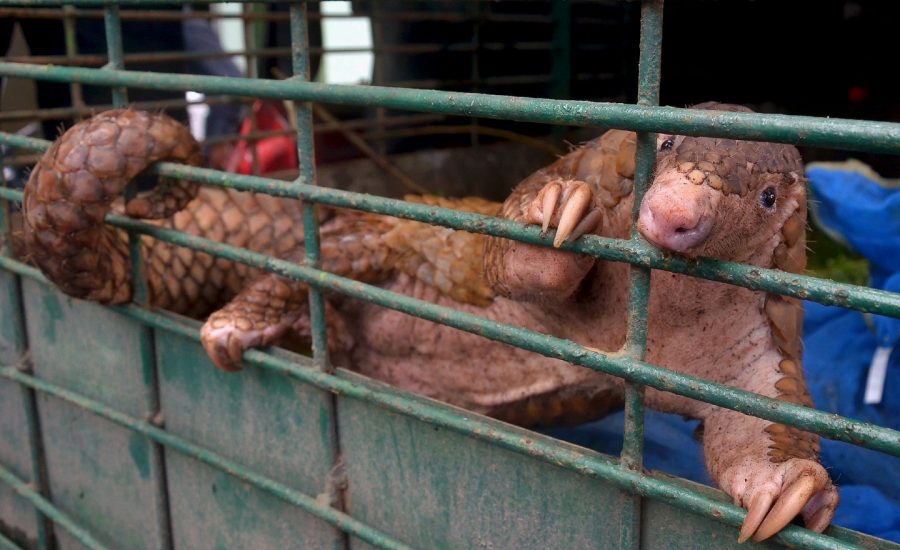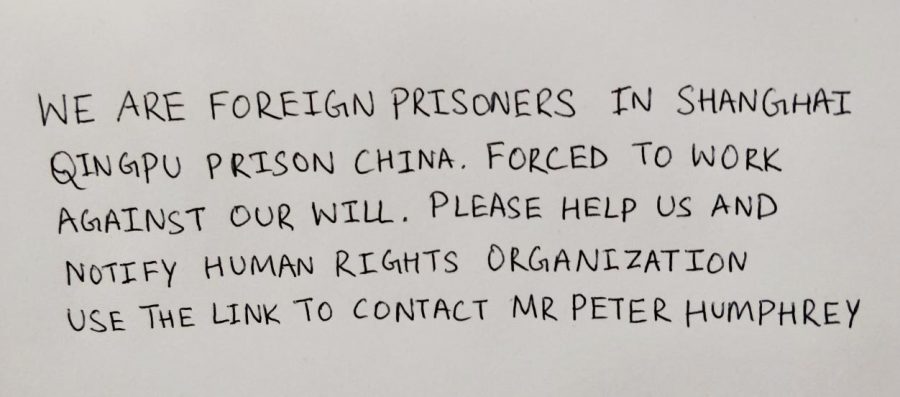By Cyril Christo via The Hill
https://thehill.com/changing-america/opinion/488295-coronavirus-should-be-a-wake-up-call-to-our-treatment-of-the-animal

“One day the absurdity of the almost universal human belief in the slavery of other animals will be palpable. We shall then have discovered our souls and become worthier of sharing this planet with them.”
Martin Luther King
“To think that we can have a viable human economy by destroying the Earth’s economy is absurd. Indigenous people still live in a universe, but we don’t- we live in an economic system.”
Thomas Berry, “The Mystique of the Earth
The coronavirus did not manifest from nowhere. Our sadistic treatment and manipulation of animals for centuries has come back to haunt us. It is time for humanity to absorb the lessons of the animal world.
From the Orient the world has inherited a civilization upending event, this coronavirus feeding on the human strain. It is perhaps not a coincidence that it has manifested at the very time the UN is trying to form a Convention on Biological Diversity to protect what remains of the organic world. The contagion is the karmic result of our own ignorance and disregard of other species that began in China and that has visited us before. As Erin Sorrell, a microbiologist at Georgetown, exclaims, 70 percent of zoonotic diseases come from wildlife.
As the 2003 SARS virus already proved. Then the culprit may have been Asian palm civets. Today’s pandemic may have been caused by pangolins. The scale-covered mammals are kept in caged conditions in markets in Asia in criminally appalling realities, reserved for dinner menus. Most animals in these markets are dying and thirsty and kept in squalid containers moved and shipped around as if they were simple commodities. The conditions are a nightmare and have even prompted many Chinese to close the animal trade. How we treat animals affects entire ecosystems and habitats, the only real wealth we as a species have. China’s ban on wild animal markets may well be the one silver lining in this ensuing global tragedy, but it should become a permanent ban, not a temporary palliative because other viruses may well ensue in the not distant future given climate change is upon us.
Major conservation groups have also pleaded for Vietnam to take stringent measures to close its wildlife markets. Vietnam’s prime minister Nguyen Xuan Phuc has ordered the ministry of agriculture and rural development to ban the consumption of wildlife. We can only hope these initiatives manifest quickly and foster a new relationship to what remains of the Mekong basin’s wildlife. Vietnam’s actions will hopefully prevent not only new outbreaks in the future but also keep even more potentially virulent viruses from overwhelming the globe.
Wall Street has had the jitters, tens of millions in China have been as impacted as when the Mongol Golden Horde swept into the Middle Kingdom in the 13th century. But whatever deaths have overtaken our species in the last few months, deaths that number in the thousands, we should not forget the root source of this scourge, humanity’s revolting disregard, manipulation, and outright slaughter of our fellow beings, the animals of the earth.
The deafening silence of absent species marks our time as singular. What extinctions are happening will become more impactful than WWI, WWII or the Great Depression combined because now we have an enormous, almost unfathomable ecological tab to reckon with, and not just the folly of an economic system run amuck. The entire spectrum of nature’s syllabus is being played out. Our relationship with the sentient world will have to reverse or we perish. The coronavirus is the tip of the iceberg.
Animals were always considered cardinal spiritual, sentient and even intellectual beings in the lives of indigenous peoples and many civilizations past. But as colonial and technological powers overran the world, indigenous peoples were treated no better than the buffalo, or whale or pangolin or bat. And now our disregard of the others bears a karmic component we cannot ignore.
The criminal neglect and dismantling of Nature over the last century have led us to a point where globalization itself will have to be rapidly reappraised. Wall Street may have lost some ground, but the mounting possible extinction toll is many magnitudes more vital than the arbitrary machinations of the Dow. The death toll on millions of acres of rainforests lost, coral reefs bleached and species eradicated the world over has brought us to this point. It is the invisible aura of loss we have inherited. It is the karma our species is inheriting. The locust invasion of East Africa is a Biblical cohort to the virus of East Asia. Now our entire immune system as a species and that of the planet is under siege.
Paul Shepard, the eloquent ecologist who wrote triumphantly about the importance of animals, wrote in “The Others: How Animals Made Us Human,” “People are asked to rely on faith in the invisible and intangible, repudiating the beasts on which primal peoples depend as intermediaries, embodying spirits, affirming death, giving form to the mystery of the multiple truths of mortal existence, and acting as a vehicle to other realms.” It is not coincidental that this “Christian-” based society has so neglected its first teachers, the animals, for several thousand years and put so much faith in invisible gods and the afterlife, intangibles that have divorced us from life and the very soil on which we depend for our survival.
We have in Henry Heston’s words become “cosmic outlaws.” If we lose the animals, we will become inconsolable orphans. This most minute but insidious of beings, the coronavirus is a wake-up call to our unconscious selves. We have wrapped ourselves in a cocoon of technological, synthetic and decorative cultural achievement burdened with pride that strains and depletes our full values as sentient beings. In the process, we have ignored the suffering and sentience of others. The physiologist Rene Dubos once wrote that humans could adapt “to starless skies, treeless avenues, shapeless buildings, tasteless bread, joyless celebrations, spiritless pleasures — to a life without reverence for the past, love for the present, or poetical anticipations of the future, but it is questionable that man can retain his physical and mental health if he loses contact with the natural forces that have shaped his biological and mental nature.”
How we converse and conduct ourselves in the next year or two will morph into a different realm of relating, and hopefully into a more respectful species. We may need to grow roots under our feet once again and cultivate what Levi Strauss called an “ecological civicism.” We may need more than a pause from the pace of globalization that began to convulse the world two generations ago. Will we return to the same numbers game of outlandish growth, and greed when already much of the pollution from northern China seems to have dissipated from the map? Is not our entire fixation on profit a psychic numbing that has divorced us from ecological coherence?
Maybe the coronavirus is a warning sign, the first real test of our global community that has emerged from the Pandora’s box of an increasingly incorrigible species. Amazon-size ecosystems are in jeopardy. This insidious half live, half un-live being called corona has taken over our sleep and waking life like an alien invasion. Let us be grateful the next time we see a flock of birds flying miraculously overhead, or the next time we see a koala holding on to a branch for dear life, or the next time we see a dolphin dancing over the waves. And know these beings did not have to die a merciless, hapless, sick death in some market of central China where this virus originated.
The virus has given us a fever, yes, just as we have imposed a fever on the climate of the earth. Milan Kundera in the “Unbearable Lightness of Being” reminds us in one of the most poignant lines ever written, “Humanity’s true moral test, its fundamental test, which is deeply buried from view, consists of its attitude towards those who are at its mercy: animals. And in this respect humankind has suffered a fundamental debacle so fundamental that all others stem from it.”
And it is possible that the coronavirus may be just another contagion in a long line of lessons we will have to inherit from our fellow creatures. Recently a wolf’s head was discovered by mammoth tusk hunters in Siberia dating from 30,000 years ago. What viruses are embedded in their flesh? What strains will invade our civilization like ghosts from a forgotten Pleistocene seeping out from under the crying and collapsing torrent of glaciers up north, seeping slowly onto our shores? Will we learn the lesson that the pangolin, one of the most trafficked and severely abused mammals on earth, the one that has filled so many markets in Asia, is teaching us now across the time zones of the world? Will we make sure now that it does not go extinct? Even its exquisite plates, the only armored mammal on Earth, could not protect itself from the diabolic hunger of our species. Will the coronavirus humble us to the reality that humans make up just .01 percent of life on Earth? Will we have to absorb a virus so virulent, so complete in its ability to create havoc from the melting permafrost in the Arctic that humanity will become irreparably crippled?
The coronavirus in its all-pervasive pandemonium is a wake-up call, not just to our well-being and souls but also how we had better conduct ourselves towards the other species of this Earth, they who enable life as we know it. The coronavirus is a karmic test that we need to pass so that we as a species can transcend our conduct on this planet we have maligned and mistreated for far too long.
One immensely vital and fragile bioregion that promises potentially lethal pathogens is the Arctic. The great thaw at the top of the world, with ice melting at an extraordinary rate, with polar bears, whales and many other beings having to survive the immune breakdown of the region, is the main reason Shell and other mining and fossil fuel industries should stay clear from the region. Five years ago French scientists discovered a “giant virus” in a 30,000- year-old sample of permafrost in Siberia that had retained its infectivity. If we industrialize these areas and ride roughshod over the roof of the world we risk waking up pathogens we thought we had eradicated or helped foster the spread of things even worse than smallpox, said researcher Jean Michel Claverie.
Jean Malaurie, the remarkable French geologist and explorer of the Arctic who fought for the preservation of the Inuit from the contrivances and pollution of Western man, once expounded, “Men of science, like men of the state, have a duty imposed by ethics. The Earth is living: it can and will avenge itself: already there are portents. The Earth has no time left for man’s ignorance, arrogance, sophistry, and madness.”








